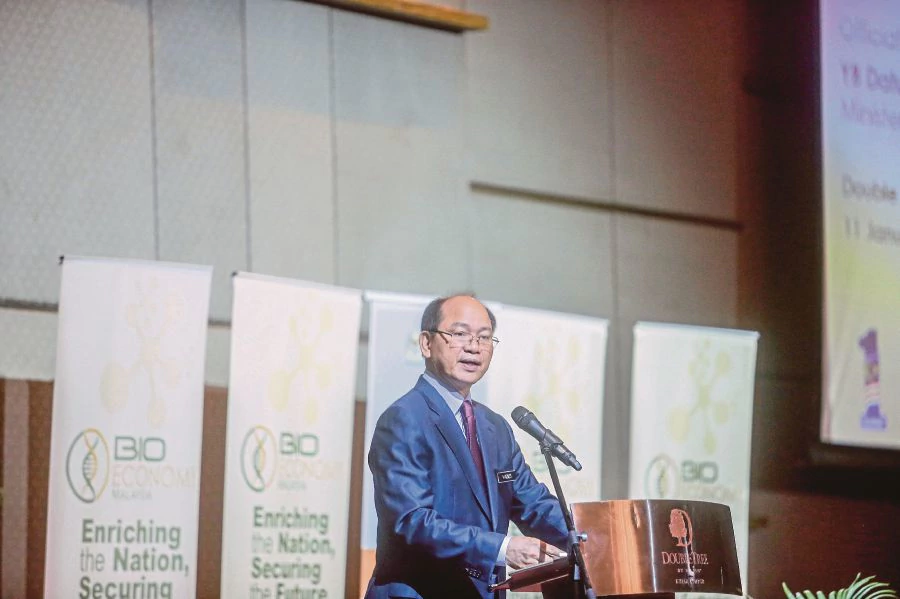BIOECONOMY refers to the production of renewable biological resources for food, feed, chemicals, energy and healthcare wellness products via innovative and efficient technologies. And, in 2005, Malaysia began a drive to make bio-based industry a key economic driver, launching the National Biotechnology Policy (NBP) under the stewardship of then visionary minister of science, technology and innovation, the late Tan Sri Dr Jamaluddin Jarjis.
The ambitious target set for the sector: contribute five per cent to the nation’s gross domestic product (GDP) by 2020. The NBP, a well-crafted, 15-year masterplan, provides a comprehensive roadmap to that destination, one that helps foster a conducive ecosystem for accelerated industry growth.
Since 2005, strategies have been implemented in three five-year phases:
PHASE I — Capacity Building (2005 – 2010);
PHASE II —Science to Business (2011 – 2015); and,
PHASE III — Global Business (2016 – 2020).
We are midway through Phase III, positioning Malaysia’s bio-based industry on the world stage, consolidating our strengths and capabilities in developing home-grown bio-based innovations, boosting commercialisation and penetrating international markets. Malaysia aims to produce at least 20 global companies to spearhead the value creation process for the bio-based industry beyond 2020. Two of them are on the way there:
PURE CIRCLE SDN BHD — manufacturer of stevia sweeteners for the food and beverage industry, and listed on the London Stock Exchange; and,
BIO ALPHA HOLDING BHD — food and supplement products listed on the Bursa Malaysia.
On Bioeconomy Day (Jan 11), Science, Technology and Innovation (Mosti) Minister Datuk Seri Wilfred Madius Tangau revealed some encouraging figures.
As of December last year, the Malaysian Bioeconomy Development Corporation (BioEcorp) has 77 trigger projects under the Bioeconomy Transformation Programme (BTP).
Together, the projects are expected to provide more than 26,700 job opportunities, with cumulative approved investments of more than RM17 billion in 2020. BioEcorp has also implemented 37 Bioeconomy Community Development Programme (BCDP) projects, involving more than 2,800 participants. These projects will impact more than 13,000 residents around the project areas.
The minister pointed out that bio-based companies continued to be the main pillar in catalysing holistic changes encompassing economic, governance, and social development.
From 2016 to last year, there has been an increase of RM150 millions of total approved investments captured by 283 BioNexus companies (from RM6.66 billion to RM6.81 billion). The companies created 10,665 jobs, an increase of 4.2 per cent compared with 2016 (10,238). Furthermore, the BioNexus companies recorded an average annual growth rate of 18 per cent in terms of revenue generation from 2008 to December last year.
Madius said the growing bio-based sector had positioned Malaysia well as an investment destination.
“Biotechnology has been transforming the industry from commodities to value-added products. Malaysia has also been a favoured investment destination due to biotechnology developments, such as the Palm Oil Industrial Cluster in Lahad Datu, Sabah, as well as Bio-XCell Malaysia in Nusajaya, Johor.”
The BioNexus and BTP-status companies will have to establish themselves as pioneers of leading edge bio-based businesses. Malaysia is well-primed to excel by focusing on high-impact, high-growth and high-technology areas capable of driving the continuous development of home-grown technologies.
In the long run, the sector is expected to generate new economic opportunities and create a broad spectrum of novel bio-based sectors in the country. Bioeconomy, being at the heart of many technological advances, has the potential to address some of the most pressing challenges, such as feeding a growing population and offering alternatives to dwindling natural resources. It is a game changer for Malaysia’s economic growth.
Tapping into and sustainably using the country’s vast biodiversity has the potential to increase the country’s economic competitiveness, creating jobs, enhancing health, food security while addressing environmental concerns. With three years to go until 2020, the challenge lies in increasing the number of bio-based industry players and to have a stronger global presence for locally-produced products.
A few notable programmes designed to achieve that are already in place. For instance, the BCDP will focus on enhancing the socio-economic wellbeing of the rakyat by providing opportunities for higher income rural employment.
BTP participants and BioNexus-status companies, meanwhile, will focus more on the downstream industries and using bio-based technologies to manufacture value-added products. Bio-based companies will be supported with mentoring and commercialisation programmes, such as BioNext and BioShoppe that help our bio-based products penetrate the international market. And, BioEcorp will continue to be the lead bioeconomy development agency.
In arguing for the realisation of Transformasi Nasional 2050, which he launched last year, Prime Minister Datuk Seri Najib Razak had this to say: “Bioeconomy — through innovation and technological advancement — has the potential to make a significant contribution towards our country becoming a knowledge-based, high income nation.”
Twitter:@zakriZAH
The writer is science adviser to the prime minister and chairman of the Malaysian Bioeconomy Development Corporation (BioEcorp) News Straits Times.
Retrieved from https://www.nst.com.my/opinion/columnists/2018/01/327513/delivering-bioeconomy-promise

